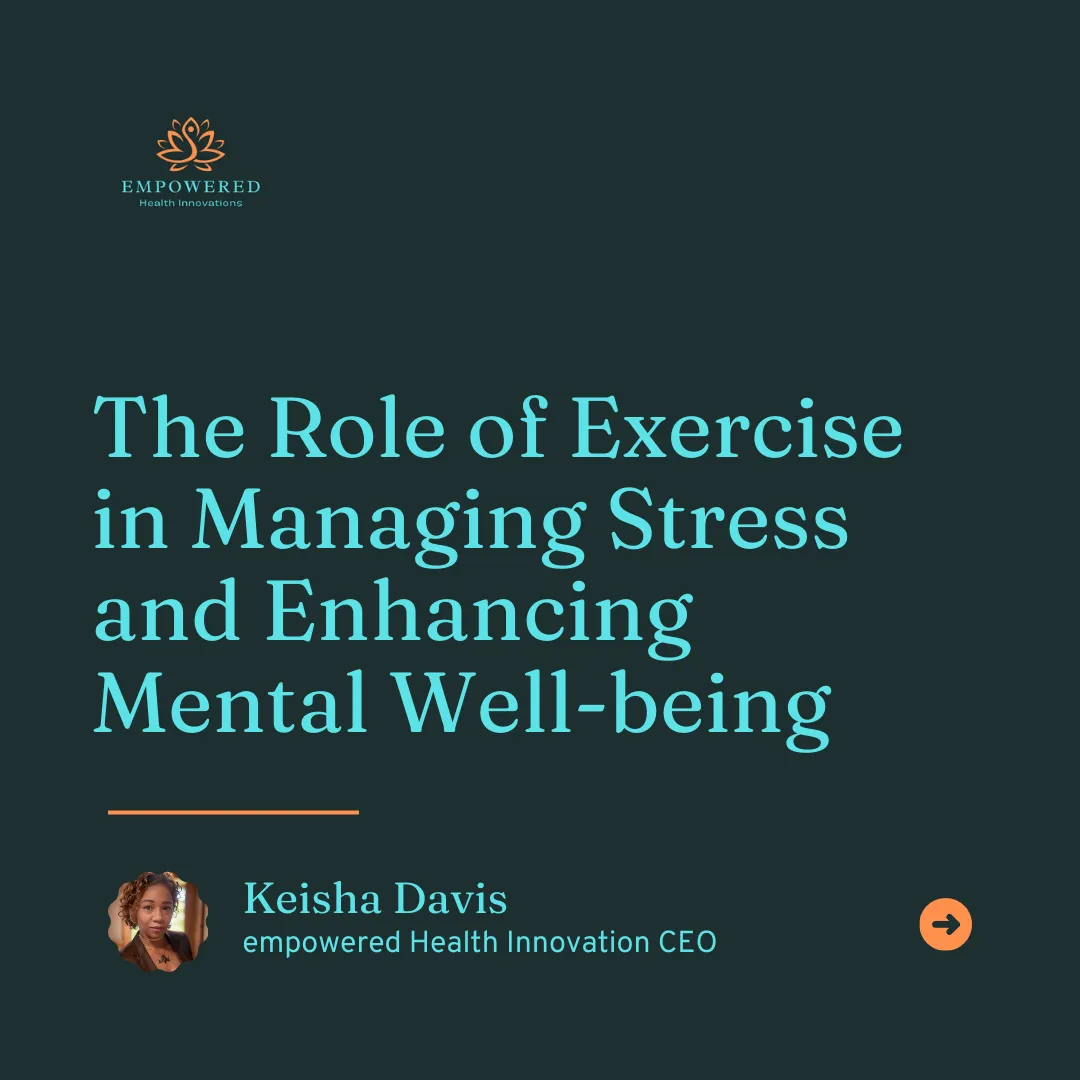
The Role of Exercise in Managing Stress and Enhancing Mental Well-being
The Role of Exercise in Managing Stress and Enhancing Mental Well-being
Exercise is a powerful tool for improving mental health and managing stress. Regular physical activity has been shown to reduce anxiety, depression, and negative mood by improving self-esteem and cognitive function. Here’s a closer look at how exercise contributes to stress management and mental well-being.
1. Stress Reduction
Exercise helps reduce stress by triggering the release of various neurotransmitters and hormones that contribute to a sense of well-being:
Endorphins: Physical activity increases the production of endorphins, often referred to as the body’s natural painkillers and mood elevators. These chemicals interact with receptors in your brain to reduce your perception of pain and trigger positive feelings.
Norepinephrine: Exercise boosts levels of norepinephrine, a neurotransmitter that can moderate the brain's response to stress. Higher levels of norepinephrine can help you better manage stress and anxiety.
2. Improved Mood
Regular exercise can significantly improve mood and reduce symptoms of depression and anxiety:
Serotonin: Exercise stimulates the production of serotonin, a neurotransmitter that plays a key role in mood regulation. Increased serotonin levels are associated with feelings of well-being and happiness.
Dopamine: Physical activity boosts dopamine production, enhancing mood and motivation. Dopamine is also involved in reward and pleasure mechanisms in the brain.
3. Enhanced Cognitive Function
Exercise benefits cognitive function, which can help you manage stress more effectively:
Neurogenesis: Regular physical activity promotes the growth of new brain cells, particularly in the hippocampus, an area of the brain involved in memory and learning. This process, known as neurogenesis, can improve cognitive function and emotional regulation.
Brain-Derived Neurotrophic Factor (BDNF): Exercise increases levels of BDNF, a protein that supports the survival, growth, and differentiation of neurons. Higher BDNF levels are linked to better cognitive function and mood regulation.
4. Better Sleep
Quality sleep is essential for mental health and stress management, and exercise can improve sleep patterns:
Sleep Quality: Regular physical activity helps regulate sleep patterns, making it easier to fall asleep and stay asleep. Improved sleep quality enhances overall mental well-being and reduces stress levels.
Circadian Rhythm: Exercise helps synchronize your internal body clock, or circadian rhythm, which can help regulate sleep-wake cycles and improve overall sleep quality.
5. Increased Resilience
Engaging in regular exercise can make you more resilient to stress:
Physical Resilience: Physical fitness enhances your body’s ability to handle stress by improving cardiovascular health, muscle strength, and overall endurance. This physical resilience can translate into better mental resilience.
Mental Toughness: Regular exercise can build mental toughness and self-discipline, making it easier to cope with challenges and stressors in everyday life.
Types of Exercise for Mental Well-being
Different types of exercise offer various benefits for mental health and stress management:
Aerobic Exercise: Activities such as running, swimming, cycling, and brisk walking increase heart rate and boost endorphin levels, providing significant mood-enhancing benefits.
Strength Training: Weightlifting and resistance exercises can improve mood by increasing dopamine levels and reducing anxiety.
Mind-Body Exercises: Practices like yoga, tai chi, and Pilates combine physical movement with mindfulness, reducing stress and promoting relaxation.
Group Activities: Participating in team sports or group fitness classes can provide social support and reduce feelings of isolation, enhancing overall well-being.
Practical Tips for Incorporating Exercise into Your Routine
Start Small: Begin with manageable amounts of exercise and gradually increase the duration and intensity as you become more comfortable.
Find Activities You Enjoy: Choose exercises that you find enjoyable to make it easier to stick with a routine. This could be anything from dancing to hiking.
Set Realistic Goals: Set achievable fitness goals to stay motivated and track your progress.
Make it a Habit: Schedule regular workout times and make exercise a non-negotiable part of your daily routine.
Stay Consistent: Consistency is key. Aim for at least 30 minutes of moderate exercise most days of the week.
Incorporate Variety: Mix different types of exercises to keep things interesting and work different muscle groups.
Conclusion
Exercise is a highly effective way to manage stress and enhance mental well-being. By incorporating regular physical activity into your routine, you can benefit from improved mood, reduced anxiety, better cognitive function, and increased resilience to stress. Remember to choose activities you enjoy, start small, and stay consistent to reap the full benefits of exercise for your mental health.